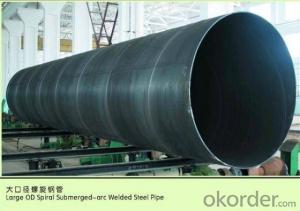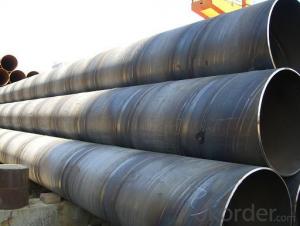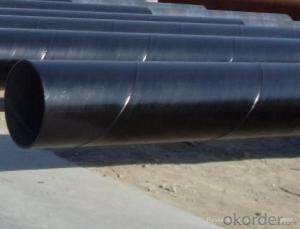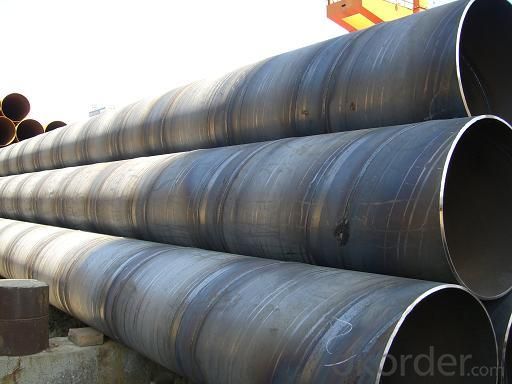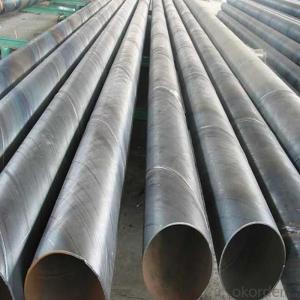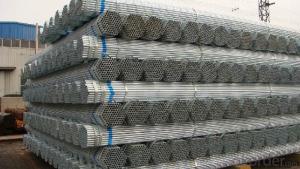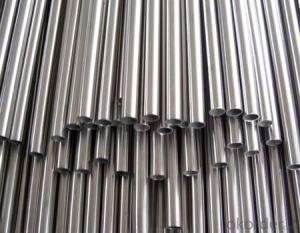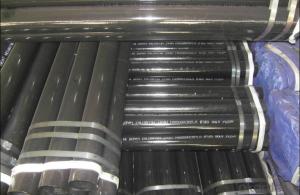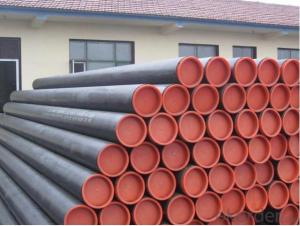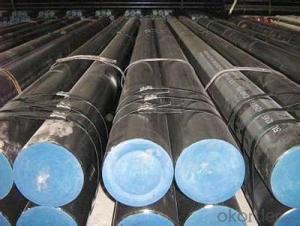SPIRAL CARBON STEEL PIPE ASTM A106
- Loading Port:
- China Main Port
- Payment Terms:
- TT OR LC
- Min Order Qty:
- -
- Supply Capability:
- -
OKorder Service Pledge
OKorder Financial Service
You Might Also Like
Packaging & Delivery
Packaging Detail: | standard export packing or as customer's requirement |
Delivery Detail: | within 10 - 30 days |
Specifications
Spiral Welded Steel Pipes and Tubes
1.Material:Q195-Q235
2.Length:1-12m
3.WT:1.0-14mm
4.O.D.:20-273mm
Spiral Welded Steel Pipes and Tubes
Product Description:
1.Material : Q235,Q345,L245,L290,L360,L415,L450,L485,GrB,X42,46,X52,X56,X60,X65,X70,X80,X100
2,Standard: SY/T5037-2000,GB/T9711-2011,API Spec 5L PSL1/PSL2,ASTM A252\A53,ISO3183,DIN17172,EN10217,JIS G3457,AWWA C200,ASTM A139,ASTM A671,ASTM A672
3.Wall thickness: 3.0mm-30mm
4.Outer diameter: φ168mm-3020mm
5,Length: 5m-12m or as your requirement
6,Corrosion protection standard: DIN30670,DIN30671, AWWAC210, AWWA C203, SY/T0413-2002,SY/T0414-2002
7,Application: Oil, gas, natural gas, water pipe, thermal electricity pipe, steel structure engineering, etc
Q195-q345 Material Steel Pipe's Materials
Elements | Chemical Compsition% | Mechanical Property | ||||||
| C% | Mn% | S% | P% | Si% | Yield Point (Mpa) | Tensile Strength(Mpa) | Elongation |
Q195 | 0.06-0.12 | 0.25-0.50 | <0.050 | <0.045 | <0.030 | >195 | 315-430 | 32-33 |
Q215 | 0.09-0.15 | 0.25-0.55 | <0.05 | <0.045 | <0.030 | >215 | 335-450 | 26-31 |
Q235 | 0.12-0.20 | 0.30-0.70 | <0.045 | <0.045 | <0.030 | >235 | 375-500 | 24-26 |
Q345 | <0.20 | 1.0-1.6 | <0.040 | <0.040 | <0.55 | >345 | 470-630 | 21-22 |
- Q: What is the difference between seamless and ERW steel pipes?
- Seamless steel pipes are made without any welded joints, resulting in a uniform and continuous structure. On the other hand, ERW (Electric Resistance Welded) steel pipes are created by welding the edges of the steel strip or coil together, forming a seam. This seam may be visible on the surface of the pipe. While seamless pipes are considered stronger and more reliable due to their uniform structure, ERW pipes are more cost-effective and commonly used for low to medium pressure applications.
- Q: Are steel pipes suitable for underground chemical transport?
- Steel pipes are generally considered suitable for underground chemical transport due to their high strength and durability. Steel pipes can withstand the pressure and weight of the soil above them, making them resistant to damage or collapse. Additionally, steel pipes are corrosion-resistant, which is crucial when transporting chemicals that may react with or corrode other materials. They are also able to handle a wide range of temperatures, making them suitable for transporting chemicals that may require specific temperature conditions. However, it is important to consider the specific chemical being transported and consult with experts in chemical engineering or pipeline design to ensure that the steel pipes are compatible with the chemical and that any necessary safety measures are in place.
- Q: What are the different types of steel pipe coatings for marine applications?
- There are several types of steel pipe coatings commonly used for marine applications, including epoxy coatings, polyurethane coatings, zinc coatings, and fusion-bonded epoxy coatings. Each coating offers different benefits such as corrosion resistance, abrasion resistance, and protection against marine organisms. The choice of coating depends on factors such as the specific marine environment, the level of corrosion protection required, and the budget.
- Q: What are the quality control measures for steel pipe manufacturing?
- Quality control measures for steel pipe manufacturing include various inspections and tests to ensure the pipes meet the required standards and specifications. Some common quality control measures include visual inspections for surface defects, dimensional checks to ensure accurate size and length, ultrasonic or magnetic particle testing for detecting internal or surface defects, hydrostatic testing to check for leaks or weaknesses, and chemical analysis to verify the composition of the steel. Additionally, adherence to proper manufacturing processes, documentation of procedures, and regular audits are also part of quality control measures in steel pipe manufacturing.
- Q: How can galvanized steel tubes be painted on the surface?
- Suitable for galvanized base material (antirust primer), epoxy zinc yellow primer (double component), epoxy ester zinc yellow primer.Pretreatment of galvanized sheet when brushing:1, conditional, you can zinc plating phosphating treatment, or first spray a layer of phosphating primer.2, or smooth zinc plating surface sweeping treatment.3, the galvanized workpiece, galvanized pipe surface with solvent (that is, epoxy zinc yellow primer, thinner) wipe, in order to remove the workpiece crude oil protective layer, and increase cleanliness.4, two-component epoxy zinc yellow primer: in strict accordance with the proportion of paint and curing agent paint, and aging 30 minutes later, modulation suitable construction viscosity, you can spray.One component epoxy ester primer: zinc yellow construction viscosity suitable to construction of modulation, the correct construction method.
- Q: How are steel pipes transported?
- Steel pipes can be transported through different means depending on their size, weight, and the distance they need to cover. The primary modes of transportation for steel pipes are trucks, trains, and ships. For shorter distances, trucks are often used to transport steel pipes. The pipes are loaded onto flatbed or specialized trailers designed to securely hold and transport them. Trucks are convenient for transporting steel pipes to nearby locations or construction sites, as they can easily navigate local roads and highways. For longer distances, trains are the preferred mode of transportation. Steel pipes are loaded onto flatcars, which are specifically designed to carry heavy loads. Trains offer a cost-effective and efficient means of transporting large quantities of steel pipes over long distances. They can accommodate pipes of various lengths and diameters, making them a versatile option. When it comes to international shipments or transportation over bodies of water, ships are commonly used. Steel pipes can be loaded into shipping containers or onto the deck of cargo ships. Shipping containers provide protection from weather conditions and ensure the pipes remain secure during transit. Specialized ships equipped with cranes can handle large and heavy pipes, making the transportation of oversized steel pipes possible. In certain cases, pipelines can be constructed to transport steel pipes directly from the manufacturing facility to the desired location. This method is commonly used for oil, gas, or water pipelines. By laying the pipes underground, the need for separate transportation is eliminated. Overall, the transportation of steel pipes involves a range of methods, including trucks, trains, ships, and pipelines. The choice of method depends on factors such as distance, quantity, and project requirements. Each method offers its own advantages and is selected based on considerations such as cost, efficiency, and logistics.
- Q: How do you prevent steel pipes from freezing in cold climates?
- To prevent steel pipes from freezing in cold climates, it is important to insulate the pipes properly. This can be done by wrapping them with insulation sleeves or foam, which helps to retain heat and prevent rapid temperature changes. Additionally, ensuring that there is proper ventilation in the area where the pipes are located can help to maintain a higher temperature and prevent freezing.
- Q: What are the different pressure ratings for steel pipes?
- Steel pipes typically have different pressure ratings, which indicate the maximum pressure that they can safely handle. The pressure ratings for steel pipes can vary depending on factors such as the pipe diameter, wall thickness, and material grade. The most common pressure ratings for steel pipes include: 1. Schedule 40: This is the standard pressure rating for steel pipes used in general applications. It is suitable for low to medium pressure systems, with a maximum working pressure of 150 psi (pounds per square inch). 2. Schedule 80: This pressure rating is used for steel pipes that need to withstand higher pressures. It has a thicker wall thickness compared to Schedule 40, allowing it to handle higher working pressures of up to 300 psi. 3. Schedule 160: This is a heavy-duty pressure rating for steel pipes used in high-pressure applications. It has an even thicker wall thickness than Schedule 80 and can handle working pressures of up to 500 psi. Apart from these standard pressure ratings, there are also specialized steel pipes available with higher pressure ratings, such as Extra Strong (XS) and Double Extra Strong (XXS). These are designed for extremely high-pressure systems and have thicker walls than Schedule 160. It is important to note that the pressure ratings mentioned above are for steel pipes specifically. The pressure rating may differ for pipes made from other materials, such as copper or PVC. When selecting a steel pipe, it is essential to consider the required pressure rating based on the specific application and system requirements to ensure safe and efficient operation.
- Q: RC is it welded steel pipe or galvanized steel pipe?
- Common pipelines in construction are as follows:SC: welded steel pipeTC: wire tubes, thin steel tubesPC: rigid plastic pipesCT: cable trayCP: metal hoseSR: steel grooveRC: water gas pipe
- Q: How are steel pipes protected against internal scaling?
- Steel pipes are protected against internal scaling through a process called internal coating or lining. This involves the application of a protective layer on the interior surface of the pipe to prevent the formation of scales or deposits. There are several methods used for this purpose. One common method is the application of epoxy coatings. Epoxy is a durable and corrosion-resistant material that forms a continuous barrier on the inside of the pipe. It helps to prevent the accumulation of minerals and other substances that can lead to scaling. Epoxy coatings are often applied by spraying or brushing onto the pipe's interior surface and then cured to form a hard and smooth finish. Another method used for protecting steel pipes against internal scaling is cement mortar lining. In this process, a layer of cement mortar is applied to the inside of the pipe. The cement mortar acts as a barrier against scaling and also provides additional protection against corrosion. This lining process is commonly used for large-diameter pipes that are used in water distribution systems. Polyethylene (PE) lining is another technique employed to protect steel pipes from internal scaling. PE lining involves the insertion of a high-density polyethylene liner into the pipe. This liner acts as a barrier against scaling and also helps to reduce friction, improving the flow of fluids through the pipe. PE lining is often used in applications where a smooth interior surface is required, such as in oil and gas pipelines. In addition to these methods, regular maintenance and cleaning of the pipes can also help prevent internal scaling. This may involve the use of chemical cleaning agents or mechanical cleaning techniques to remove any deposits that have formed on the pipe's interior surface. Overall, protecting steel pipes against internal scaling is crucial to maintain their efficiency and prolong their lifespan. By utilizing various coating and lining methods, as well as implementing proper maintenance practices, the risk of internal scaling can be significantly reduced.
Send your message to us
SPIRAL CARBON STEEL PIPE ASTM A106
- Loading Port:
- China Main Port
- Payment Terms:
- TT OR LC
- Min Order Qty:
- -
- Supply Capability:
- -
OKorder Service Pledge
OKorder Financial Service
Similar products
Hot products
Hot Searches
Related keywords
